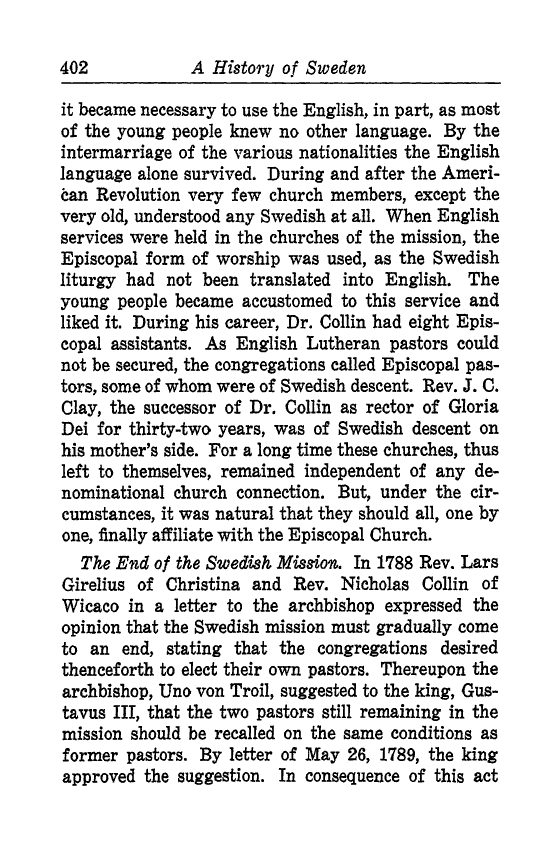
Full resolution (TIFF) - On this page / på denna sida - XXVI. Epilogue - B. The Swedish Settlements on the Delaware

<< prev. page << föreg. sida << >> nästa sida >> next page >>
Below is the raw OCR text
from the above scanned image.
Do you see an error? Proofread the page now!
Här nedan syns maskintolkade texten från faksimilbilden ovan.
Ser du något fel? Korrekturläs sidan nu!
This page has never been proofread. / Denna sida har aldrig korrekturlästs.
402 A History of Sweden
it became necessary to use the English, in part, as most
of the young people knew no other language. By the
intermarriage of the various nationalities the English
language alone survived. During and after the Ameri-
can Revolution very few church members, except the
very old, understood any Swedish at all. When English
services were held in the churches of the mission, the
Episcopal form of worship was used, as the Swedish
liturgy had not been translated into English. The
young people became accustomed to this service and
liked it. During his career, Dr. Collin had eight Epis-
copal assistants. As English Lutheran pastors could
not be secured, the congregations called Episcopal pas-
tors, some of whom were of Swedish descent. Rev. J. C.
Clay, the successor of Dr. Collin as rector of Gloria
Dei for thirty-two years, was of Swedish descent on
his mother’s side. For a long time these churches, thus
left to themselves, remained independent of any de-
nominational church connection. But, under the cir-
cumstances, it was natural that they should all, one by
one, finally affiliate with the Episcopal Church.
The End of the Swedish Mission. In 1788 Rev. Lars
Girelius of Christina and Rev. Nicholas Collin of
Wicaco in a letter to the archbishop expressed the
opinion that the Swedish mission must gradually come
to an end, stating that the congregations desired
thenceforth to elect their own pastors. Thereupon the
archbishop, Uno von Troil, suggested to the king, Gus-
tavus III, that the two pastors still remaining in the
mission should be recalled on the same conditions as
former pastors. By letter of May 26, 1789, the king
approved the suggestion. In consequence of this act
<< prev. page << föreg. sida << >> nästa sida >> next page >>